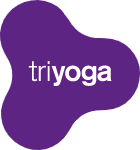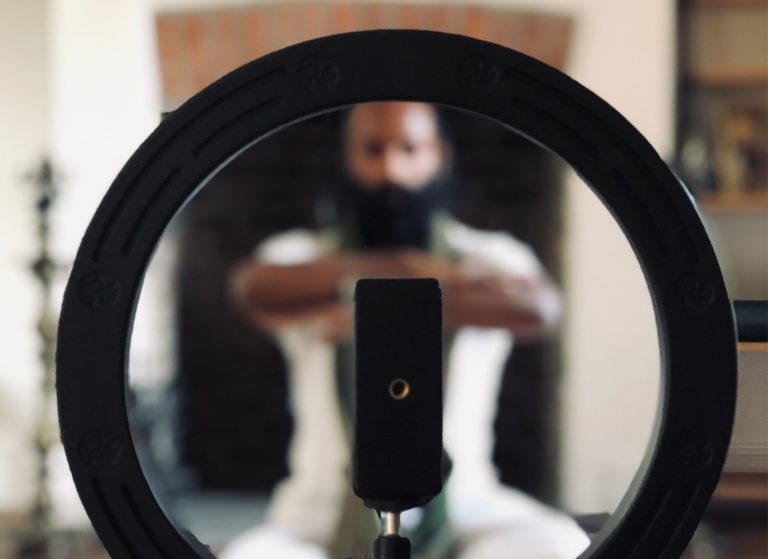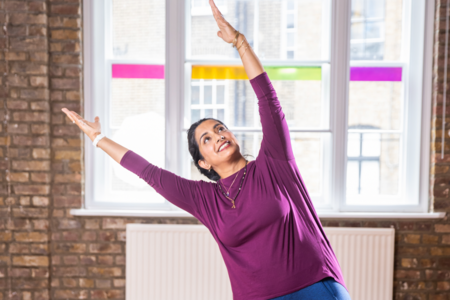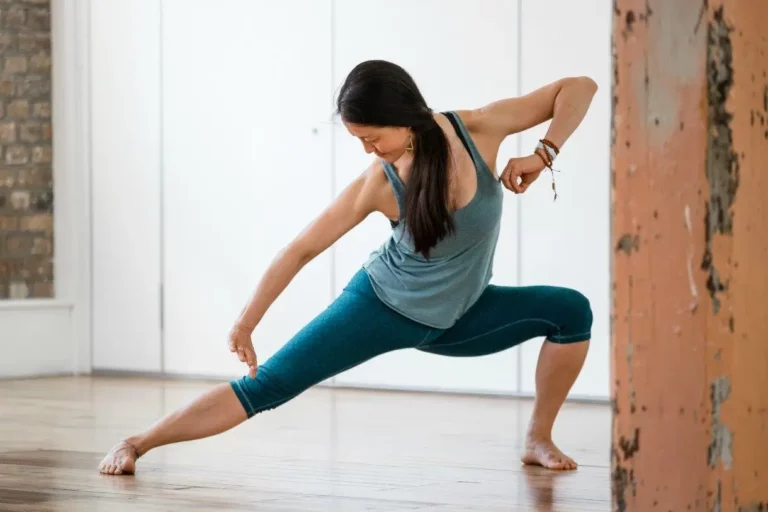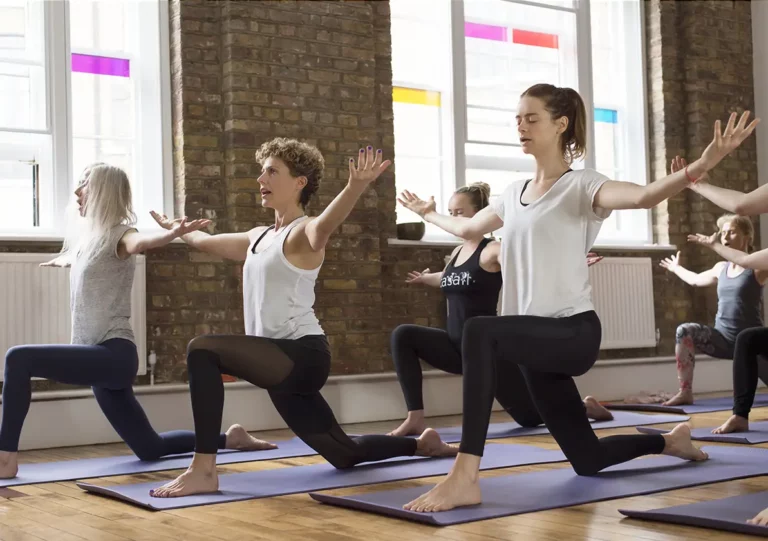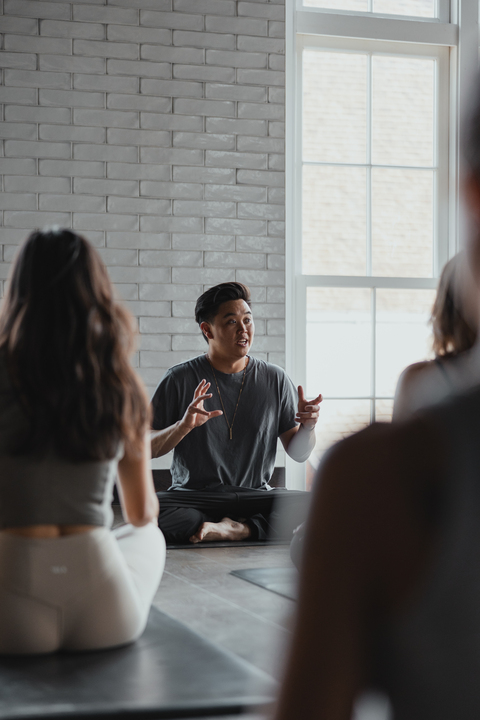Genny Wilkinson Priest, Yoga Director at triyoga, writes on how the yoga practice and teaching has changed dramatically in recent weeks – and offers helpful etiquette tips for practising online.
Photo credit: Sivaroshan Sahathevan
Yoga is an ancient, spiritual practice that has evolved continually over a few thousand years, but seemingly never so quickly as it has in the past six weeks.
When the world went into lockdown as the severity of the coronavirus outbreak became clear, restaurants, stores, pubs, gyms and yoga studios shut down overnight following not just government orders, but much more importantly the moral impetus to do so.
Closing studios, and ceasing the teaching of yoga in-person meant saving lives.
For yoga students, their teachers and studios alike this has been a difficult adjustment. In a flash, gone was what we have always known: face-to-face interaction between teacher and student, as well as the comforting immediacy of a tight, like-minded community that for some people was a daily occurrence while others more spread out but equally as important.
Students used to hug each other at the start of class, and share tea after. Teachers used to adjust their students in downward dog, prop them up with a bolster, and spot them in a headstand. We regularly sat close to one another, heads bowed in close conversation, cross-legged on wooden floors as we unpacked the meaning of ancient texts for modern times.
Now we practise yoga in front of a screen, students peering into it trying to figure out how to mute themselves, teachers flummoxed about how to stream a chant or music through Spotify onto Zoom, and studios praying automated confirmation emails have landed in in-boxes and not spam.
Nobody signed up for this, but it’s where we are.
Some studios, teachers and students have quickly adjusted to this new world, however uncomfortably (or easily) where yoga education (like everything else during lockdown) has moved online. Others have been slower to latch on, either they lack the tech skills and are uncomfortable in this new medium (and really who can blame them?) or they believe the teachings should be imparted in person, teacher-to-student, one-to-one, as is the age-old tradition.
The teaching and practice of yoga have changed dramatically in the age of coronavirus, but not the teachings themselves. Patanjali’s Yoga Sutras tell us not to move toward our desires, nor away from our aversions for both reactions bring pain and suffering. Yet still we find ourselves clinging on to some semblance of our “old” lives. That is natural and understandable. Holding on to what was, what we loved, and mourning what was taken away from us so abruptly is normal.
Buddhism, so closely linked to yoga philosophy, teaches us that everything in human life is always changing, inconstant, born again and again. That we thought things would last forever exposes our lack of understanding – or perhaps acceptance – that things simply don’t.
It doesn’t mean things are now worse, or things were then better. It means only that things are now different. And it’s uncomfortable not knowing what the future holds, whether we will be able to see and hug our teacher (or mother, or neighbour) when the lockdown ends amid what we can reasonably expect will be continued social distancing. In a yoga studio, this might mean fewer classes with less people in them, and two metres space between mats. That might mean teachers not adjusting or assisting, and wearing a mask. And that might mean fewer yoga studios as some find it impossible to continue operating financially under these reduced circumstances – already in America many have permanently closed their doors.
The way that yoga is taught and practised has changed overnight, remodeled out of necessity, but not repurposed. The teachings are still the same – we can resist them and this new world, or we can stand up, accept it, and ultimately expand. Maybe this, the most difficult of situations, is where the true learning begins.
Yes, we are being challenged. But can you challenge yourself to see that this is temporary, ever-changing and ever-moving? There is so much beauty in impermanence – just like the wisteria that three weeks ago was in full blossom, its petals no less beautiful now as they float in the wind and settle into the fertile spring ground below.
That we still have these opportunities to practise and teach yoga, however altered, is a testament not just to the creativity and unwavering commitment of those passionate about the practice, but also to the power and draw of yoga itself.
We are blessed to have these teachings!
We don’t have to know where we are going, and we don’t have to know how it will all work out. If we accept this in resolute, yet agile ways, our collective consciousness will become a little less hectic.
We will get there, and we will be together again.
O wonder
How many godly creatures are there here!
How beauteous mankind is! O brave new world
That has such people in’t!
– William Shakespeare, The Tempest, Act V, Scene I, II: 203 – 206
Etiquette for practising yoga online
- If you have an injury, arrive in the Zoom room 10 minutes early to tell your teacher about it through the private chat function
- If you are pregnant, please don’t practise yoga in the first trimester. Rather rest, relax and nurture yourself and your baby.
- If in the second or third trimester, and have never practised yoga before, it’s best you attend a pregnancy class. If you have a regular practice, are pregnant and wish to attend a yoga, barre or Pilates class, please arrive into the Zoom room early and tell your teacher.
- Clear the space as best you can, moving furniture to the side so that you have room to practise safely.
- Practising yoga at home means heightened penchant for distraction! Turn off the notifications on your phone, and ensure privacy and separation from the outside world for the duration of the class as best you can.
- You will be muted upon entry; please stay muted otherwise it is difficult for others to hear the teacher’s instructions.
- Teaching online makes it trickier for your teacher to personally and intimately attend your needs, so please take responsibility for your own safety. Do not practise postures that do not feel right in the moment.
- You can turn off your camera if you do not wish to be seen, an especially useful function if wearing pajamas.
- It’s great if you have yoga props like a brick, block or strap, (you can buy them here) but don’t worry if you don’t. Improvise with a book, blankets, a belt and pillows, especially useful in a restorative, or Iyengar yoga class.
- For a yoga nidra class, bring extra pillows and blankets to comfortably prop the body and allow it to settle.
Genny Wilkinson Priest is the Yoga Director at triyoga.
